Venus by Shocking Blue
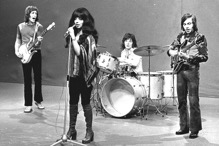 Venus by Shocking Blue a 1969 song written by Robbie van Leeuwen. In 1970, the Dutch rock band Shocking Blue took the song to number one in nine countries. In 1981 it was sampled as part of the Stars on 45 medley. In 1986, the British female pop group Bananarama returned the song to number one in seven countries. The composition has been featured in numerous films, television shows and commercials, and covered dozens of times by artists around the world.
Venus by Shocking Blue a 1969 song written by Robbie van Leeuwen. In 1970, the Dutch rock band Shocking Blue took the song to number one in nine countries. In 1981 it was sampled as part of the Stars on 45 medley. In 1986, the British female pop group Bananarama returned the song to number one in seven countries. The composition has been featured in numerous films, television shows and commercials, and covered dozens of times by artists around the world.
Released in late 1969 as a single from the group’s third album Scorpio’s Dance (later also on reissues of the second album At Home), Shocking Blue’s single reached number one on the Billboard Hot 100 on 7 February 1970. RIAA certification came on 28 January 1970 for selling over one million copies in the US, garnering a gold record. Worldwide, the single sold over 7.5 million copies.
The song’s lead vocals are performed by Mariska Veres. The song’s music and lyrics were written by Robbie van Leeuwen, the band’s guitarist, sitarist and background vocalist, who also produced along with record producer Jerry Ross. Van Leeuwen originally miswrote the line “…the goddess on the mountain top…” as “…the godness on the mountain top…”, so Veres sang it this way on the hit recording of the song.
All Right Now by Free
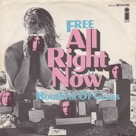 All Right Now by Free is a single by the English rock band Free. The song, released in 1970, hit #2 on the UK singles chart and #4 on the US Billboard Hot 100 singles chart. “All Right Now” originally appeared on the album Fire and Water, which Free recorded on the Island Records label, formed by Chris Blackwell. In 1991, the song was remixed and re-released, reaching #8 on the UK singles chart.
All Right Now by Free is a single by the English rock band Free. The song, released in 1970, hit #2 on the UK singles chart and #4 on the US Billboard Hot 100 singles chart. “All Right Now” originally appeared on the album Fire and Water, which Free recorded on the Island Records label, formed by Chris Blackwell. In 1991, the song was remixed and re-released, reaching #8 on the UK singles chart.
“All Right Now” was a #1 hit in over 20 territories and was recognized by ASCAP (American Society of Composers, Authors, and Publishers) in 1990 for garnering 1,000,000 plus radio plays in the U.S. by late 1989. In 2006, the BMI London awards included a Million Air award for 3 million air plays of All Right Now in the USA.
According to drummer Simon Kirke, “All Right Now” was written by bassist Andy Fraser and singer Paul Rodgers in the Durham Students’ Union building, Dunelm House
American Woman by The Guess Who
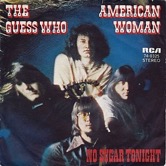 American Woman by The Guess Who is a song released by the Canadian rock band The Guess Who in November 1969, from their sixth studio album of the same name. It was later released in March 1970 as a single backed with “No Sugar Tonight”, which reached number one on the Billboard Hot 100.
American Woman by The Guess Who is a song released by the Canadian rock band The Guess Who in November 1969, from their sixth studio album of the same name. It was later released in March 1970 as a single backed with “No Sugar Tonight”, which reached number one on the Billboard Hot 100.
Billboard magazine placed the single at number three on the Year-End Hot 100 singles of 1970 list. On May 22, 1970, the single was certified as gold by the RIAA.
Bridge Over Troubled Water by Simon and Garfunkel
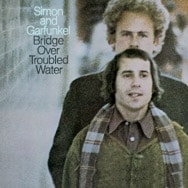 Bridge Over Troubled Water by Simon and Garfunkel is a song by American music duo Simon & Garfunkel. Produced by the duo and Roy Halee, the song was released as the follow-up single to “The Boxer” in January 1970. The song is featured on their fifth studio album, Bridge over Troubled Water (1970). Composed by singer-songwriter Paul Simon, the song is performed on piano and carries the influence of gospel music. The original studio recording employs elements of Phil Spector’s “Wall of Sound” technique using L.A. session musicians from the Wrecking Crew.
Bridge Over Troubled Water by Simon and Garfunkel is a song by American music duo Simon & Garfunkel. Produced by the duo and Roy Halee, the song was released as the follow-up single to “The Boxer” in January 1970. The song is featured on their fifth studio album, Bridge over Troubled Water (1970). Composed by singer-songwriter Paul Simon, the song is performed on piano and carries the influence of gospel music. The original studio recording employs elements of Phil Spector’s “Wall of Sound” technique using L.A. session musicians from the Wrecking Crew.
It was the last song recorded for their fifth and final album, but the first fully completed. The song’s instrumentation was recorded in California while the duo’s vocals were cut in New York. Simon felt his partner, Art Garfunkel, should sing the song solo, an invitation Garfunkel initially declined. Session musician Larry Knechtel performs piano on the song, with Joe Osborn playing bass guitar and Hal Blaine closing out the song with drums. The song won five awards at the 13th Annual Grammy Awards in 1971, including Grammy Award for Record of the Year and Song of the Year.
The song became Simon & Garfunkel’s biggest hit single, and it is often considered their signature song. It was a number one hit on the Billboard Hot 100 for six weeks, and it also topped the charts in the United Kingdom, Canada, France, and New Zealand. It was a top five hit in eight other countries as well, eventually selling over six million copies worldwide, making it among the best-selling singles. It became one of the most performed songs of the twentieth century, with over 50 artists, among them Elvis Presley and Aretha Franklin, covering the song.
Does Anybody Really Know What Time It Is by Chicago
Fire and Rain by James Taylor
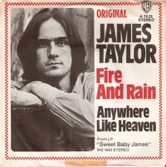 Fire and Rain by James Taylor is a folk rock song written and performed by James Taylor. Released on Warner Bros. Records as a single from his second album, Sweet Baby James, in February 1970, the song follows Taylor’s reaction to the suicide of Suzanne Schnerr, a childhood friend, and his experiences with drug addiction and fame.
Fire and Rain by James Taylor is a folk rock song written and performed by James Taylor. Released on Warner Bros. Records as a single from his second album, Sweet Baby James, in February 1970, the song follows Taylor’s reaction to the suicide of Suzanne Schnerr, a childhood friend, and his experiences with drug addiction and fame.
After its release, “Fire and Rain” peaked at number two on RPM’s Canada Top Singles chart and at number three on the Billboard Hot 100
Instant Karmal by John Lennon
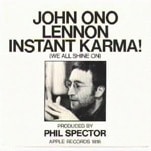 Instant Karmal by John Lennon is a song written by English musician John Lennon, released as a single on Apple Records in February 1970. In the UK, the single was credited to “Lennon/Ono with the Plastic Ono Band”. The song reached the top five in the British and American singles charts, competing with the Beatles’ “Let It Be” in America, where it became the first solo single by a member of the band to sell a million copies.
Instant Karmal by John Lennon is a song written by English musician John Lennon, released as a single on Apple Records in February 1970. In the UK, the single was credited to “Lennon/Ono with the Plastic Ono Band”. The song reached the top five in the British and American singles charts, competing with the Beatles’ “Let It Be” in America, where it became the first solo single by a member of the band to sell a million copies.
“Instant Karma!” was written, recorded and released within a period of ten days, making it one of the fastest-released songs in pop music history. The recording was produced by Phil Spector, marking a comeback for the American producer after his self-imposed retirement in 1966, and leading to him being offered the producer’s role on the Beatles’ Let It Be album (1970).
Recorded at London’s Abbey Road Studios, “Instant Karma!” employs Spector’s signature Wall of Sound technique and features contributions from George Harrison, Klaus Voormann, Alan White and Billy Preston. The B-side was a song composed and performed by Yoko Ono, titled “Who Has Seen the Wind?” Recently shorn of the long hair synonymous with their 1969 campaign for world peace, Lennon and Ono promoted the single with an appearance on Britain’s Top of the Pops.
I Want You Back by The Jackson Five
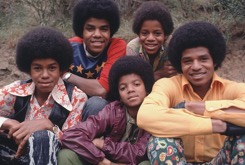 I Want You Back by The Jackson Five is a 1969 song by the Jackson 5 which became a number-one hit for the band and the Motown label in early 1970.
I Want You Back by The Jackson Five is a 1969 song by the Jackson 5 which became a number-one hit for the band and the Motown label in early 1970.
The song, along with a B-side cover of “Who’s Lovin’ You” by Smokey Robinson & the Miracles, was the only single used in the Jackson 5’s first album, Diana Ross Presents the Jackson 5. It went to number one on the Soul singles chart for four weeks and held the number-one position on the Billboard Hot 100 singles chart for the week ending January 31, 1970.
Kentucky Rain by Elvis Presley
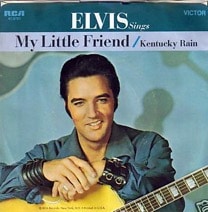 Kentucky Rain by Elvis Presley was a 1970 hit song for Elvis Presley. Featuring pianist Ronnie Milsap and written by Eddie Rabbitt and Dick Heard, the single peaked at #16 on the pop charts. It was recorded at American Sound Studio.
Kentucky Rain by Elvis Presley was a 1970 hit song for Elvis Presley. Featuring pianist Ronnie Milsap and written by Eddie Rabbitt and Dick Heard, the single peaked at #16 on the pop charts. It was recorded at American Sound Studio.
Released as a single on January 29, 1970, “Kentucky Rain” was one of the early hits in the 1970s for Presley, though the song was not included on an album until the compilation package Worldwide 50 Gold Award Hits Vol. 1 (LPM-6401); while the track does appear on the 2000 re-release of From Elvis in Memphis, it was not included on the original 1969 album. During Presleys’ February 1970 engagement, he performed it some sixteen times, introducing it as a new song “out about a week.” Live versions are available on the box sets Elvis Aaron Presley and Live in Las Vegas.
The song depicts an anxious lover as he walks and drives through the “cold Kentucky rain” in search of his missing love
Let It Be by the Beatles
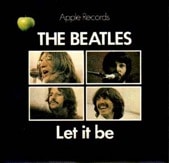 Let It Be by the Beatles is a song by the English rock band the Beatles, released in March 1970 as a single, and (in an alternate mix) as the title track of their album Let It Be. At the time, it had the highest debut on the Billboard Hot 100, beginning its chart run at number 6. It was written and sung by Paul McCartney.
Let It Be by the Beatles is a song by the English rock band the Beatles, released in March 1970 as a single, and (in an alternate mix) as the title track of their album Let It Be. At the time, it had the highest debut on the Billboard Hot 100, beginning its chart run at number 6. It was written and sung by Paul McCartney.
It was their final single before McCartney announced his departure from the band. Both the Let It Be album and the US single “The Long and Winding Road” were released after McCartney’s announced departure from and the subsequent break-up of the group.
Love Grows (Where My Rosemary Goes)
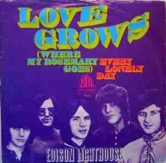 Love Grows (Where My Rosemary Goes) a popular song by “one-hit wonder” Edison Lighthouse. The single hit the number one spot on the UK Singles Chart on the week ending on 31 January 1970, where it remained for a total of five weeks. It also became the first number one single of the 1970s (not counting Rolf Harris’ “Two Little Boys” which was a holdover from 1969.
Love Grows (Where My Rosemary Goes) a popular song by “one-hit wonder” Edison Lighthouse. The single hit the number one spot on the UK Singles Chart on the week ending on 31 January 1970, where it remained for a total of five weeks. It also became the first number one single of the 1970s (not counting Rolf Harris’ “Two Little Boys” which was a holdover from 1969. Make It With You by Bread
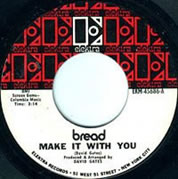 Make It With You by Bread a song written by David Gates and originally recorded by the pop-rock group Bread, of which Gates was a member. Only Gates and drummer Mike Botts appear on the song and the song was a #1 hit. The song first appeared on Bread’s 1970 album, On the Waters. Released as a single that June, it was the group’s first top-ten hit on the Billboard Hot 100 singles chart and spent the week of August 22, 1970, at number one, their only single to do so; it also reached #5 on the UK Singles Chart. Billboard ranked “Make It with You” as the No. 13 song of 1970, and it was certified gold by the RIAA for sales of over one million copies
Make It With You by Bread a song written by David Gates and originally recorded by the pop-rock group Bread, of which Gates was a member. Only Gates and drummer Mike Botts appear on the song and the song was a #1 hit. The song first appeared on Bread’s 1970 album, On the Waters. Released as a single that June, it was the group’s first top-ten hit on the Billboard Hot 100 singles chart and spent the week of August 22, 1970, at number one, their only single to do so; it also reached #5 on the UK Singles Chart. Billboard ranked “Make It with You” as the No. 13 song of 1970, and it was certified gold by the RIAA for sales of over one million copies Mama Told Me Not to Come by Three Dog Night
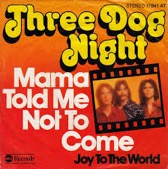 Mama Told Me Not to Come by Three Dog Night is a song by American singer-songwriter Randy Newman written for Eric Burdon’s first solo album in 1966. Three Dog Night’s 1970 cover of the song topped the US pop singles chart. Tom Jones and the Stereophonics’ cover version also hit number four on the UK Singles Chart in 2000.
Mama Told Me Not to Come by Three Dog Night is a song by American singer-songwriter Randy Newman written for Eric Burdon’s first solo album in 1966. Three Dog Night’s 1970 cover of the song topped the US pop singles chart. Tom Jones and the Stereophonics’ cover version also hit number four on the UK Singles Chart in 2000.
Also in 1970, Three Dog Night released a longer, rock ‘n roll and funk-inspired version (titled “Mama Told Me (Not to Come)”) on It Ain’t Easy.
Three Dog Night’s version had the same 3/4 by 2/4 time change as Eric Burdon’s version and featured Cory Wells singing lead in an almost humorous vocal style, Jimmy Greenspoon playing a Wurlitzer electric piano, and Michael Allsup playing guitar.
No Matter What by Badfinger
Mr. Bojangles by Nitty Gritty Dirt Band
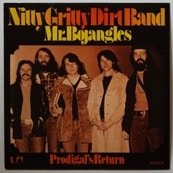 Mr. Bojangles by Nitty Gritty Dirt Band a song written and originally recorded by American country music artist Jerry Jeff Walker for his 1968 album of the same title. Since then, it has been recorded by many other artists, including US country music band the Nitty Gritty Dirt Band, whose version (recorded for the 1970 album Uncle Charlie & His Dog Teddy) was issued as a single and rose to number nine on the Billboard Hot 100 pop chart in 1971. Live versions of the song appeared on Walker’s 1977 album, A Man Must Carry On and his 1980 album The Best of Jerry Jeff Walker.
Mr. Bojangles by Nitty Gritty Dirt Band a song written and originally recorded by American country music artist Jerry Jeff Walker for his 1968 album of the same title. Since then, it has been recorded by many other artists, including US country music band the Nitty Gritty Dirt Band, whose version (recorded for the 1970 album Uncle Charlie & His Dog Teddy) was issued as a single and rose to number nine on the Billboard Hot 100 pop chart in 1971. Live versions of the song appeared on Walker’s 1977 album, A Man Must Carry On and his 1980 album The Best of Jerry Jeff Walker.
The NGDB’s single version begins with the Uncle Charlie interview (subtitled “Prologue: Uncle Charlie and his Dog Teddy”) that also precedes the song on the Uncle Charlie album. This was originally backed with another interview with Uncle Charlie, also taken from the album. When “Mr. Bojangles” started climbing the charts, the B-side was re-pressed with the same song without the interview prologue. NGDB guitarist Jeff Hanna performed most of the lead vocals on the track, with bandmate Jim Ibbotson performing harmony vocals; the two switched these roles on the last verse.
Ohio by Crosby, Stills, Nash & Young
Ohio by Crosby, Stills, Nash & Young is a protest song and counterculture anthem written and composed by Neil Young in reaction to the Kent State shootings of May 4, 1970, and performed by Crosby, Stills, Nash & Young. It was released as a single, backed with Stephen Stills’s “Find the Cost of Freedom”, peaking at number 14 on the US Billboard Hot 100 and number 16 in Canada.
Although a live version of “Ohio” was included on the group’s 1971 double album Four Way Street, the studio versions of both songs did not appear on an LP until the group’s compilation So Far was released in 1974. The song also appeared on the Neil Young compilation albums Decade, released in 1977, and Greatest Hits, released in 2004.
Knock Three Times by Tony Orlando and Dawn
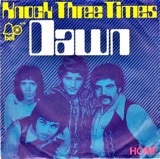 Knock Three Times by Tony Orlando and Dawn is a popular song credited to Tony Orlando and Dawn. The actual singers were Tony Orlando, Toni Wine, and Linda November, prior to the creation of “Dawn” with Telma Hopkins and Joyce Vincent Wilson.[citation needed] The song was released as a single in November 1970, paired with Orlando’s other hit song, “Candida” (also written by Toni Wine). The single hit number one on the Billboard Hot 100 in January 1971 and eventually sold six million copies, also claiming the number-one spot on the UK Singles Chart. The song registered well at Adult Contemporary stations, reaching #2 on Billboard’s “Easy Listening” survey.
Knock Three Times by Tony Orlando and Dawn is a popular song credited to Tony Orlando and Dawn. The actual singers were Tony Orlando, Toni Wine, and Linda November, prior to the creation of “Dawn” with Telma Hopkins and Joyce Vincent Wilson.[citation needed] The song was released as a single in November 1970, paired with Orlando’s other hit song, “Candida” (also written by Toni Wine). The single hit number one on the Billboard Hot 100 in January 1971 and eventually sold six million copies, also claiming the number-one spot on the UK Singles Chart. The song registered well at Adult Contemporary stations, reaching #2 on Billboard’s “Easy Listening” survey.
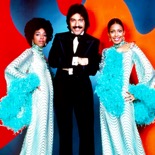 The composers of this song, L. Russell Brown and Irwin Levine, were thinking of the song Up on the Roof and they wanted to write a song with that kind of lyrical flavor, about tenement living. In the song, the singer has fallen in love with a woman who lives in the apartment directly below him but has no clue as to her interest, so he asks her to respond by either knocking three times on the ceiling (yes) or banging twice on the pipe (no), and the chorus includes sound effects of the two choices. (However, the song never states her response.)
The composers of this song, L. Russell Brown and Irwin Levine, were thinking of the song Up on the Roof and they wanted to write a song with that kind of lyrical flavor, about tenement living. In the song, the singer has fallen in love with a woman who lives in the apartment directly below him but has no clue as to her interest, so he asks her to respond by either knocking three times on the ceiling (yes) or banging twice on the pipe (no), and the chorus includes sound effects of the two choices. (However, the song never states her response.)
Michael Anthony Orlando Cassavitis was, at the time of the recording, working as a producer/singer for a rival record label, and first heard the tune recorded by another artist and immediately knew the song could be a hit if produced as he envisioned. Cassavitis cut the track under the name “Tony Orlando”, having to do the studio sessions on the “down low” to ensure that his current record label wouldn’t become aware. Upon release, the song, produced as Orlando had envisioned became a great success.
Knock Three Times actually sold more than 100,000 records a day in New York City alone for ten straight days.
My Sweet Lord by George Harrison
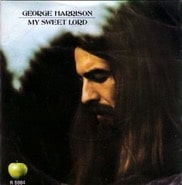 My Sweet Lord by George Harrison is a song by English musician and Beatle, George Harrison. It was released in November 1970 on his triple album All Things Must Pass. Also issued as a single, Harrison’s first as a solo artist, “My Sweet Lord” topped charts worldwide and was the biggest-selling single of 1971 in the UK.
My Sweet Lord by George Harrison is a song by English musician and Beatle, George Harrison. It was released in November 1970 on his triple album All Things Must Pass. Also issued as a single, Harrison’s first as a solo artist, “My Sweet Lord” topped charts worldwide and was the biggest-selling single of 1971 in the UK.
In America and Britain, the song was the first number-one single by an ex-Beatle. Harrison originally gave the song to his fellow Apple Records artist Billy Preston to record; this version, which Harrison co-produced, appeared on Preston’s Encouraging Words album in September 1970.
Harrison wrote “My Sweet Lord” in praise of the Hindu god Krishna, while at the same time intending the lyrics to serve as a call to abandon religious sectarianism through his deliberate blending of the Hebrew word hallelujah with chants of “Hare Krishna” and Vedic prayer. The recording features producer Phil Spector’s Wall of Sound treatment and heralded the arrival of Harrison’s much-admired slide guitar technique, which one biographer described as being “musically as distinctive a signature as the mark of Zorro”. Preston, Ringo Starr, Eric Clapton, and the group Badfinger are among the other musicians appearing on the recording.
Later in the 1970s, “My Sweet Lord” was at the centre of a heavily publicized copyright infringement suit, due to its similarity to the Ronnie Mack song “He’s So Fine”, a 1963 hit for the New York girl group the Chiffons. In 1976, Harrison was found to have subconsciously plagiarized the earlier tune, a verdict that had repercussions throughout the music industry. He claimed to have used the out-of-copyright “Oh Happy Day”, a Christian hymn, as his inspiration for the song’s melody.
Harrison performed “My Sweet Lord” at the Concert for Bangladesh in August 1971, and it remains the most popular composition from his post-Beatles career.
Imagine by John Lennon
Imagine by John Lennon is a song written and performed by English musician John Lennon. The best-selling single of his solo career, its lyrics encourage the listener to imagine a world at peace without the barriers of borders or the divisions of religion and nationality, and to consider the possibility that the whole of humanity would live unattached to material possessions.
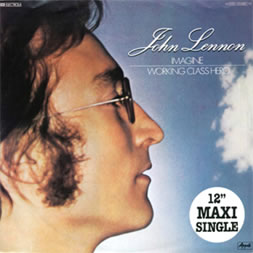 Lennon and Yoko Ono co-produced the song and album of the same name with Phil Spector. Recording began at Lennon’s home studio at Tittenhurst Park, England, in May 1971, with final overdubs taking place at the Record Plant, in New York City, during July. One month after the September release of the LP, Lennon released “Imagine” as a single in the United States; the song peaked at number three on the Billboard Hot 100 and the LP reached number one on the UK chart in November, later becoming the most commercially successful and critically acclaimed album of Lennon’s solo career. Although not originally released as a single in the United Kingdom, it was released in 1975 to promote a compilation LP and it reached number six in the chart that year. The song has since sold more than 1.6 million copies in the UK; it reached number one following Lennon’s murder in December 1980. In 1985, the Central Park Conservancy memorialised a portion of the park in honour of Lennon, called Strawberry Fields, with a mosaic that reads “Imagine”. Shortly before his death, Lennon acknowledged Ono’s role in inspiring the concept behind “Imagine”; as of June 2017, plans were underway to ensure that she receives a co-writing credit for the song.
Lennon and Yoko Ono co-produced the song and album of the same name with Phil Spector. Recording began at Lennon’s home studio at Tittenhurst Park, England, in May 1971, with final overdubs taking place at the Record Plant, in New York City, during July. One month after the September release of the LP, Lennon released “Imagine” as a single in the United States; the song peaked at number three on the Billboard Hot 100 and the LP reached number one on the UK chart in November, later becoming the most commercially successful and critically acclaimed album of Lennon’s solo career. Although not originally released as a single in the United Kingdom, it was released in 1975 to promote a compilation LP and it reached number six in the chart that year. The song has since sold more than 1.6 million copies in the UK; it reached number one following Lennon’s murder in December 1980. In 1985, the Central Park Conservancy memorialised a portion of the park in honour of Lennon, called Strawberry Fields, with a mosaic that reads “Imagine”. Shortly before his death, Lennon acknowledged Ono’s role in inspiring the concept behind “Imagine”; as of June 2017, plans were underway to ensure that she receives a co-writing credit for the song.
BMI named “Imagine” one of the 100 most-performed songs of the 20th century.
Another Day by Paul McCartney
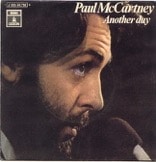 Another Day by Paul McCartney is a song recorded by Paul McCartney in New York in 1970, during the sessions for his album Ram. Although it was the first single of McCartney’s solo career, “Another Day” was written and previewed during the Beatles’ Let It Be sessions in 1969. It was released on 19 February 1971 in the UK, with “Oh Woman, Oh Why” as the B-side. Neither song was included on the Ram album.
Another Day by Paul McCartney is a song recorded by Paul McCartney in New York in 1970, during the sessions for his album Ram. Although it was the first single of McCartney’s solo career, “Another Day” was written and previewed during the Beatles’ Let It Be sessions in 1969. It was released on 19 February 1971 in the UK, with “Oh Woman, Oh Why” as the B-side. Neither song was included on the Ram album.
Another Day” is written in an observational style reminiscent of “Eleanor Rigby”; Denny Seiwell, the drummer from the Ram Sessions, called it “‘Eleanor Rigby’ in New York City.” The lyrics describe the drudgery and sadness of an unnamed woman’s life at work and at home.
Paul’s wife, Linda McCartney, provided vocal harmonies on “Another Day”. Describing his and Linda’s distinctive harmonies, McCartney said “I wanted ‘our’ sound.” Paul was deliberately attempting to create a unique McCartney style, a musical identity outside of the Beatles
Black Dog by Led Zeppelin
It’s Too Late by Carole King
Gypsy, Tramp, and Thieves by Cher
Peace Train by Cat Stevens
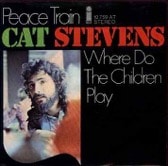 Peace Train by Cat Stevens is the title of a 1971 hit song by Cat Stevens, taken from his album Teaser and the Firecat. The song climbed to No. 7 on the Billboard Hot 100 chart during the week of October 9, 1971, becoming Stevens’ first US Top 10 hit.
Peace Train by Cat Stevens is the title of a 1971 hit song by Cat Stevens, taken from his album Teaser and the Firecat. The song climbed to No. 7 on the Billboard Hot 100 chart during the week of October 9, 1971, becoming Stevens’ first US Top 10 hit.
The song also spent three weeks at No. 1 on the adult contemporary chart. It is also featured on The Very Best of Cat Stevens compilation album. He re-recorded the song for War Child in 2003.
Pop songs with messages of peace were common in the Vietnam War era, and “Peace Train” was preceded by “Give Peace a Chance” in 1969. Not everyone found Cat Stevens’s peace-themed song convincing, however.
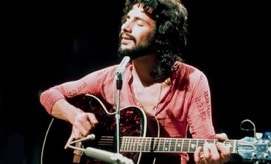 Robert Christgau criticized “Peace Train’s” message in his November 1972 Newsday review of a concert by Stevens at the New York Philharmonic Hall: “I don’t mind when Johnny Nash sings a charming ditty about how things are getting better, but when Stevens informs the world that we’re all on a peace train, I get annoyed. We’re not, and if Stevens ever stops shaking his head long enough to see clearly for a second, he might realize it.”
Robert Christgau criticized “Peace Train’s” message in his November 1972 Newsday review of a concert by Stevens at the New York Philharmonic Hall: “I don’t mind when Johnny Nash sings a charming ditty about how things are getting better, but when Stevens informs the world that we’re all on a peace train, I get annoyed. We’re not, and if Stevens ever stops shaking his head long enough to see clearly for a second, he might realize it.”
Cat Stevens later converted to Islam, changed his name to Yusuf Islam, and reduced his public appearances, but during the Iraq War he commented on the song’s renewed relevance, saying: “‘Peace Train’ is a song I wrote, the message of which continues to breeze thunderously through the hearts of millions. There is a powerful need for people to feel that gust of hope rise up again. As a member of humanity and as a Muslim, this is my contribution to the call for a peaceful solution.”
You’ve Got a Friend by James Taylor
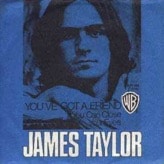 You’ve Got a Friend by James Taylor a 1971 song written by Carole King. It was first recorded by King, and included in her album Tapestry. Another well-known version is by James Taylor from his album Mud Slide Slim and the Blue Horizon. His was released as a single in 1971 reaching number 1 on the Billboard Hot 100 and number 4 on the UK Singles Chart. The two versions were recorded simultaneously in 1971 with shared musicians.
You’ve Got a Friend by James Taylor a 1971 song written by Carole King. It was first recorded by King, and included in her album Tapestry. Another well-known version is by James Taylor from his album Mud Slide Slim and the Blue Horizon. His was released as a single in 1971 reaching number 1 on the Billboard Hot 100 and number 4 on the UK Singles Chart. The two versions were recorded simultaneously in 1971 with shared musicians.
“You’ve Got a Friend” won Grammy Awards both for Taylor (Best Male Pop Vocal Performance) and King (Song of the Year).
